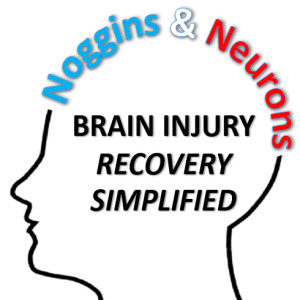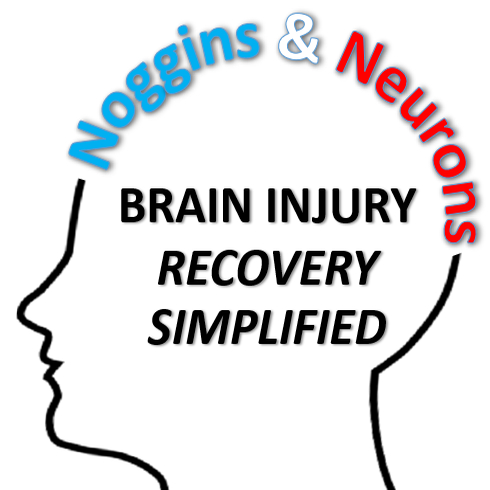Episodes

Saturday Sep 24, 2022
Brain Computer Interface with Occupational Therapist Lauren Souders
Saturday Sep 24, 2022
Saturday Sep 24, 2022
MEMBERSHIP IS HERE!
Join us in the Founders Circle Membership
A community for brain loving nerds like us who want more!
LISTEN ON YOUR FAVORITE SITE
✨Google Podcasts ✨iTunes ✨Spotify

Join the Noggins And Neurons Facebook Group
As always, we want to hear your top takeaways! Please email us at: NogginsAndNeurons@gmail.com.
If you enjoy listening, please share with others who you think would benefit. Also, consider donating to NOGGINS & NEURONS. You can do this is 2 ways:
- Donate to Noggins And Neurons and get an Allstar Pete Trading Card
- Using your PayPal app

LINKS TO ARTICLES, BOOKS AND OTHER IMPORTANT INFORMATION:
excerpt of the information that was submitted and reviewed by the FDA: "10 Summary of Clinical Performance Testing
The Neurolutions System has been evaluated in 40 subjects across three separate clinical studies (described below), all of which evaluated use of the Neurolutions system in chronic stroke survivors. All three studies were designed to determine the feasibility of recording electroencephalogram (EEG) signals from the affected and/or unaffected brain hemispheres, and to use the signals to control a computer to facilitate movement of a robotic hand orthosis (Handpiece). The results of the studies have been analyzed to determine if the Neurolutions System can be used to positively impact rehabilitation. These three studies were open-label studies whereby a literature meta-analysis assessing usual care as well as minimal clinically important difference (MCID) benchmarks were utilized for comparison of device effectiveness in lieu of randomized control data.
Results of testing demonstrate that following 12-weeks of use of the Neurolutions System, chronic stroke survivors showed increases in the mean change from their baseline scores on the primary outcome measure for the three respective studies. Ten of the total 40 subjects were assessed utilizing the Action Research Arm Test (ARAT) as the primary outcome measure and the mean scores exceeded the Minimal Clinically Important Difference (MCID) of 5.7 points. In the two other studies, 30 of the total 40 subjects were assessed utilizing the Fugl-Meyer Upper Extremity (UEFM) assessment as the primary outcome measure. For 66.7% of these 30 subjects, mean scores exceeded the MCID of 5.25 points. UEFM data were collected in 30 subjects from studies.
Results of Pooled Analysis: The results from 30 subjects across two studies may be validly pooled because the studies have the same primary endpoint and were conducted under nearly identical protocols (including inclusion/exclusion criteria and treatment regimen) and investigated the same version of the device in a very similar patient population (as evidenced by a comparison of the demographic data). Moreover, the primary endpoint, change in UEFM, was compared at the same timepoint, and the studies were weighted relative to their size. Based on the foregoing, a pooled analysis for UEFM, including all 30 subjects from the two studies, resulted in a mean change at 12-weeks of 7.77 points (SD of 5.041, two-sided, one-sample t-test, p-value < .0001), which exceeds the Minimal Clinically Important difference (MCID) of +5.25 points reported in the literature.
Across the two pooled clinical studies, 100% (30/30) of the subjects demonstrated improvement on the primary outcome measure, UEFM. A total of 66.7% of these subjects exceeded the minimal clinical important difference (MCID). The MCID is the change in a treatment outcome as measured by a trained clinician and regarded as important and clinically meaningful to health professionals and patients.[1],[2],[3],[4] The remaining 33.3% of the subjects, although demonstrating improvement, did not achieve the MCID.
For a cohort of 12 patients who participated in, durability data was assessed at 6-months following completion of their 12-week study visit. Durability assessment of the primary and secondary outcome measures revealed these subjects maintained their level of improved functional and motor performance. This demonstrates that the motor improvements achieved with the Neurolutions System therapy were maintained at 6-months following the last device use. However, as durability testing has not been completed beyond 6-months, persistence of benefits beyond 6-months post device use are currently unknown.
The results of these clinical studies support the feasibility of recording EEG signals from the affected and unaffected hemisphere and demonstrate that a computer can use these signals to control the motor output of a robotic handpiece (orthosis). Results of testing demonstrate that movement of the affected fingers, through the use of the Neurolutions System, can positively impact rehabilitation of the affected arm in individuals who suffer from chronic (≥ 6 months post-stroke) upper extremity hemiparesis resulting from stroke."
Website Items:
-
Link to FDA Approval Announcement: FDA Approval Announcement
-
Link to DeNovo Announcement: IpsiHand_DeNovo
Publications of Interest:
IpsiHand in the Media:
-
Podcast: Giving Stroke Patients a Hand (patient testimonial)
-
Life Changing Technology (Bloomberg Report Special on BCI (Minute Time Mark: 7):
-
Engaging the Mind and the Brain with Neurotechnology (YouTube, Dr. Eric Leuthart)
RESOURCES:
- Noggins And Neurons Resources: “Beyond the Basics: Motor Recovery Bootcamp” program. A complete guide for practitioners who want to understand and use modified Constraint Induced Therapy.
- Information about Pete’s blog and book, “Stronger After Stroke: Your Roadmap to Recovery” 3rd edition:
- Blog: blogspot.com
- Book: Stronger After Stroke, 3rd edition
- Deb's OT Resources:
- Deb's OT resources
- The OT's Guide to Mirror Therapy
- Tri-Fold Mirror (US address only)
- Occupational Therapy Intervention: Scavenger Hunt Visual Scanning for Adults
- NEW! Presentation: OT & Mirror Therapy: What’s Behind the Reflection? Learn about this fascinating intervention and start helping stroke survivors today!
- Doro's website - the neuro hub
REQUEST TO BE A GUEST ON NOGGINS & NEURONS. If you’re passionate about stroke recovery and have information or a story you believe will help others, we’d love help you share it on the show. Complete the guest request form below and let’s see if we’re a good fit! Guest Request Form
MUSIC: “Soft Inspiration” by Scott Holmes/Scott Holmes Music/scottholmesmusic.com


No comments yet. Be the first to say something!